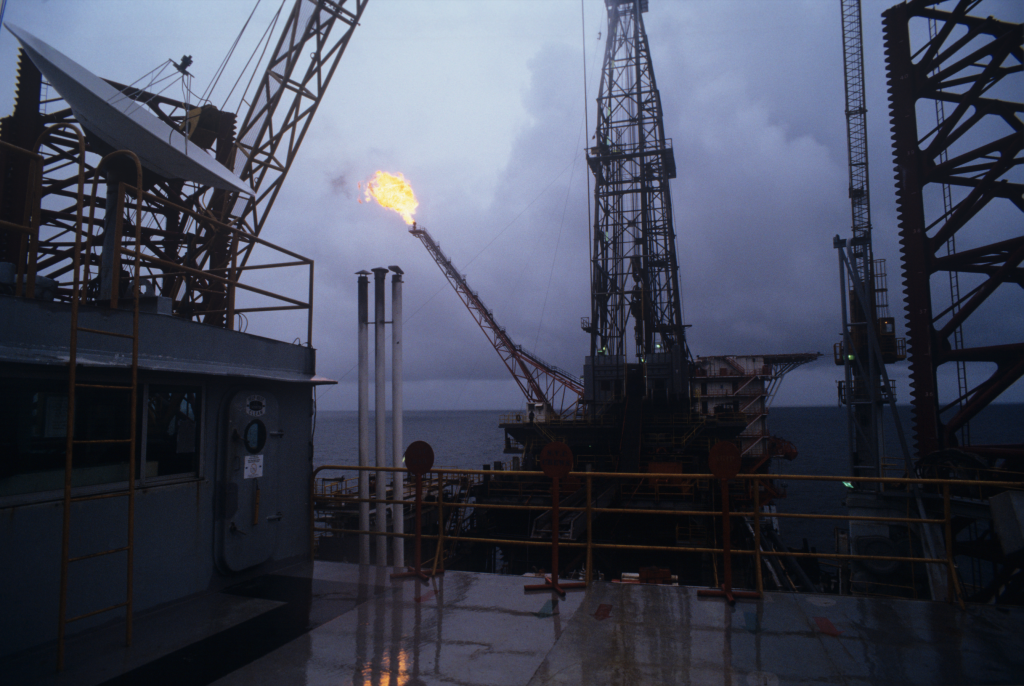Article and Pictures by Nicholas George Donovan Grazia

Oil is power, and until we move away from this very notion then we will be addicted to oil for an unseeable future and suffer the great consequences that arise from fossil fuel consumption.
Our political and economic system at the moment revolves around oil, in fact Timothy Mitchell states in his book Carbon Democracy that we live in a system described as democracy as oil and that the central object of democratic politics in the West, the economy, emerged as an abstraction, escaping the limits of the material universe.
The problem we now face is that peak oil is filled with imprecision and uncertainty; what is peak oil you may ask? In a strict sense, it depicts the moment at which the extraction of petroleum attains a rate greater than that at any time in the past or future. In a broader sense, the term illustrates the notion that such a time will be reached in the not-too-distant future after which petroleum extraction will enter terminal decline. With that being said, climate change and harm to the environment, which is ultimately the suffering endured by fossil fuels, is a science that has survived political backlash with its legitimacy intact. Mitchell suggests that dominion over oil means dominion over democracy, hence to move towards a carbon free environment we must detach democracy from oil.
Unfortunately that does not seem like the case in the near future. Extraction and production of oil is continuously given a green light as it is at the center of the economy, being continuously fed with conflicts as they guarantee its survival via money circulation. War, as history shows, ends up being the driving force as there is no better way of making money move. Through war, oil is able to generate a vast amount of capital and consequently the recycling of that specific capital is then needed.

We will now break down the reasons as to why we are constantly addicted to oil in this day and age and from there explore the possibilities of a future untied from oil.
One can argue that as a species we are not addicted to oil, and that this so called addiction is a myth. But is it really? Do consumers really have a choice when it comes to the use of oil like they do with food, housing, clothing, cement and steel. I don’t think so, because if we compare oil with other consumer goods we can see that it’s not as if in grocery stores they only provide you with one choice of food or that the price of housing and clothing dependent on foreign entanglements half a world away, and I can guarantee you that we do not go to war in order to maintain access to cement and steel. When the regular bloke pulls up to a gas station they really only have one choice, and that choice is gasoline.
Another reason we are unable to move away from oil is the amount of traveling we do by airplane, to this day we have no substitute for jet fuel. Power density plays a big role on the reason as to why we are currently unable to move past our oil addiction and into the use of renewable forms of energy. Power density simply means the amount of power, or time rate of energy transfer, per unit volume. No source of energy beats fossil fuels and specifically oil in power density terms. With oil you are able to drill a hole in the ground and generate tremendous amounts of energy whilst with renewables such as solar and wind you require very large areas of land for much fewer energy produced. Among many problems we face, total energy demanded is expected to grow and for us to continue living the way we desire to live as a human species, nothing beats oil in regards to giving us the standard of life we have become accustomed to. As Mitchell says, only about 22% of people which make up the professional class will benefit from a decarbonized society because the remaining 78% of those who make up the working class have their lives based on carbon producing jobs, this was perfectly portrayable in France with the “Gilets Jaune” protests that occurred due to an attempt by the French Government to phase out carbon emissions by raising gas prices in order to make gasoline less attractive, this resulted in an immediate backfire as citizens were not happy because gasoline, thus petroleum, is the only affordable means for transportation in todays world, because alternative ways are still out of reach for the common man or woman. Al Jazeera perfectly narrates why these protests happen and they correspond directly to what Timothy Mitchell had to say about who benefits from the so called “green policies”; at the start of the 2018 President Macron increased fuel prices by 20% and further planned a fuel tax hike to follow, the President stated that this was necessary to protect the environment and combat climate change, but protesters on the other hand claimed the decision was yet another sign that the arrogant and privileged president is out of touch with regular people who are trying to make ends meet. These protests forced the government to make a U-Turn and permanently shelve the green policies it had in mind, making it seem currently impossible to detach our world from oil.
Back in 2006 President Bush warned the world of the dangers of being addicted to oil, but here we are more than a decade later proving how truly hard it is to break that habit. If we were to take a snapshot in time of where we are headed today it does not look too good for both the climate and the environment, shares of oil supplies from the middle east continue to grow and have risen to its highest since the 1970’s. The real issue is not developed countries, although they remain largely import-dependent on oil and their populations are the biggest consumers. Developed countries deserve some accolades in terms of being able to reduce and cut oil consumption through higher efficiency and weaker growth. The real issue at hand are emerging economies who have become “oil-thirsty”. China and India have increased their oil consumption by 73% and 60% respectively over the last decade. The drop in oil prices that occurred a few years ago was bad for oil companies but great for consumers as sales of gas guzzling SUV’s have been booming throughout.
Going back to the power density argument and why we are so addicted to oil, there is another related matter to discuss. We are so addicted to petroleum because nothing in the world creates energy the way oil does. For example, let’s take one barrel of oil which is the standard unit of measure for crude oil. One barrel consists of 42 gallons and the approximate energy contained within one barrel is 5.8 Million BTU’s or 1’700 kWh of energy. No other source of energy comes close to oil. Theres more to it, in a barrel of crude oil nothing is wasted. From one barrel of oil we generate about 20 gallons of gasoline, 12 gallons of distillate fuel (sold as diesel), 4 gallons of jet fuel, and all the rest makes up for more than a dozen other petroleum products where the petrochemical industry uses to make a variety of chemicals and plastics. It is very difficult to think of a world without petroleum as 80% of human energy needs derive from oil.

One of the main and underlying reasons as to why we cannot turn away from oil is because, like energy from fossil fuels, mass democratic politics are a recent phenomenon and the development of these two powers have been interwoven from the start, the dismantling of these two powers would mean the destruction of our current political and economic system because like Mitchell states, dominion over oil means dominion over democracy.
Oil above all else defied the limits of growth that exist in our material universe through the famous object known as the economy, the center object of democratic politics in the west. Oil laid down the foundations and with its seemingly infinite supply allowed for the economy to increase in size without any form of ultimate material constraint by transitioning to a system of monetary circulation, this evolution of the economy into the abstract separated nature and politics; although today we are aware that oil is finite, it still is the major part of the economy allowing it to continue growing and sustain this system of monetary circulation.
The big actors of oil will not let the world free itself of its addiction anytime soon as oil revenues allowed Iran, Saudi Arabia and other gulf states to accumulate massive amounts of US Dollars. The U.S. and its banks needed and still need ways to recycle the huge accumulation of petrodollars in the middle east and bring back the money to the U.S. There no way it could be done through ordinary consumers or capital purchases by the oil producing nations of the middle east, those were insufficient because there is no way of consuming things or building things fast enough to create demand for more. The only solution was weapons and war. Timothy Mitchell says that arms are useful in these types of situations because they are useless, you don’t buy them to use them up so you can always buy more and a “small” object such as a fighting jet can cost millions of dollars. Therefore the existence of petrostates in the middle east and across the globe are important for “the Economy” as it allows for the recycling of petrodollars back into the U.S. in forms of weapons sales attributed to the petrostates, whom the west keep in unstable political systems to ensure conflict and more weapon purchases.
Adair Turner claims that a “zero carbon economy is both feasible and affordable” but frankly I disagree with him. The earth’s reservoir of fossil fuels will never be exhausted completely; as coal and oil become more scarce or the difficulty and cost of extraction increases, the cost and expenditure of energy that extraction requires will bring the era of fossil fuels to an end with consequences we cannot yet fathom… and it will happen in a remarkably short period.
More than half the oil consumed from 1860 until today has been burned in three decades! The consumption of these sources of energy has caused irreversible environmental damage accompanied by climate and health problems that have been of a catastrophic magnitude on a planetary scale.

A world without carbon seems to lead to an undemocratic world as the two powers cannot be currently separated. To formulate a carbon free world we must identify a new dependency that is not oil in order to please the working class, otherwise we will fall into chaos as more “Gilet Jaune”-like protests will swarm the globe. Energy is indeed one of modernity’s fundamental mediums and metrics, therefore the social mastery of eater’s energies is also one of the most potent of modernity’s ideological tropes. Energy is the worlds most important industry and governments, throughout time, have taken shortcuts to modernity by ploughing through resources in order to spread light, generate development, and draw its citizens out of the metaphorical darkness.
In modernity we see energy as the principal component in both a statistical and ideological sense. Gavin Bridge states that we are in an energy crisis, where he suggests that the gran arc of human progress is beginning to stall, and the lights of prosperity have begun to flicker and dim. One may argue that this crisis has begun, that we have reached a moment of collective existential doubt and that the ability of energy consumers to continue to summon energy in familiar ways has suddenly been called into question. It is true that we are consuming more than we are producing! New discoveries of oil reservoirs are not keeping up with the pace as we exhaust our existing supplies. At this rate of consumption oil companies have to somehow find and produce 3 to 4 million barrels per day of new production every year just to keep up, in practical terms thats the equivalent of having to discover and develop a new Saudi Arabia (in terms of oil reservoirs) every 3 to 4 years. Toppled with the current information on Saudi Arabia’s reserves, it seems that Saudi Arabia will become a net importer of oil by 2030. The issue here is having to find new reserves the size of Saudi Arabia and also replace the original Saudi Arabia.
This seems all so very dark for the future of oil, and the truth is that oil will indeed run out but I do not believe it will run out any time soon because as we move forward with technology we will be able to find ways in order to extend petroleum’s lifetime. The real issue we face with continued consumption of oil is the problem for our climate and for our environment, therefore changes need to be made but they will not be either feasible or affordable as many obstacles will be encountered along the way. The idea of peak oil is filled with imprecisions, but the idea of moving away from oil should not only stem from the notion that we are running out but for the fact that this amount of carbon consumption is just bad for the planet, therefore we must arrive at a conclusion where we only utilize oil for what is really indispensable without it and move towards greener solutions for the rest.
In the end we are still left with the same issue of how our political and economic system is intertwined with oil and how the working class cannot live without it because its the only affordable way of transportation and many workers make a living through the means of carbon consumption. That is why we need to find a new dependency, a new addiction that will allow our economic system to flourish the same way and through that make way for a new democratic future allowing the working class to make a living. What Turner says is all very true, but he makes it sound too easy. He states it perfectly in this phrase, which I agree with him completely, saying that “the issue is not feasibility, but whether governments, industries, and consumers are willing to take the actions required to get there”. And by “there” we mean achieving net zero carbon emission by 2060 by boosting the role of electricity.
To get “there” Turner says we must quintuple our annual investments in renewable energies for the next 40 years. To really make a difference renewable energy must become cheaper than oil, today electric cars are too expensive for middle to low income families. Turner states that in the next 10 years if we begin moving towards renewables and really cleaning up the electric sector, consumers might find some advantages such as finding electric cars cheaper than gas or diesel filed cars; but in many other cases a greener world will cost the consumer more than it does today and will reduce the world economy by 0.5%.
What costs are we talking about? If the world we intend to move forward to is the one Turner envisions, then by adopting his three technologies onto the use of electricity through solar, wind, and a little bit of the non renewable nuclear power the cost of living the way we know it will most definitely increase. At the moment we are talking about technology we only know today, therefore all of this can change. The three technologies are the use of hydrogen power via electrolysis using zero carbon electricity. Steel producers can use hydrogen as a reduction agent and ammonia can be used to fuel ships. The use of bioenergy, and thirdly a technology to capture CO2 emissions. The costs we will face are those of creating zero carbon steel that will make cars and any form of transport more expensive, and the use of bio based fuel for aviation will make plane tickets a lot more expensive.
Now this is the idea of scholars and experts on the situation. I unfortunately believe it will be too hard to move away from oil in the near future because of the various reasons I have stated in this article. I believe that the perfect substitute to oil would be nuclear energy. Although it is not renewable per se, it is the most efficient form of energy and with the right technology and management, nuclear waste can be well taken care of in a way that does not harm the environment.

First of all, the waste generated from a nuclear plant is relatively small and the waste is not particularly hard to manage. Safe methods for the final disposal of high-level radioactive waste are technically proven; the international consensus is that geological disposal is the best option. Nuclear energy is safe for the environment as it creates no greenhouse gasses and with the right strategies the waste can be managed in a way where it does not hurt nor damage the earth. It is in fact the cleanest energy and it can become our new dependency.
Unfortunately there is a negative perception on nuclear energy due to a number of failed attempts that resulted in catastrophic disasters such as Chernobyl, making people believe it is unsafe. In comparison to carbon based fuels and other renewables, its power density is very high and it is very efficient as it doesn’t need the use of a valuable resource such as hydrocarbons. Today, the reactor technology is well developed and it is cost effective when a standardized reactor design is used. We should 100% incorporate nuclear power in our energy portfolio as I believe it is the only feasible substitute that will allow human beings to progress on our desired path to prosperity.
There is a big challenge now between what energy source will emerge in a post petroleum world. Nuclear vs renewables, and I believe that nuclear power is the most attractive, the most effective, and the only viable alternative to fossil fuels.

Back to reality! With oil scarcity and climate change posing unique anti-democratic challenges, only through deep reflection of the political impacts of fossil fuels may we avoid our earlier pratfalls and achieve “more democratic futures”. Oil consumers must recognize that in this particular moment they are bound in a codependent relationship with the Middle-East and other petrostates, and are likely to remain so for years to come. With an addiction so difficult to get rid of, it is crucial that it is carefully managed. Oil is still the power, and our current political and economic systems are heavily tied to oil, therefore the notion of dominion over oil means dominion over democracy is a reality we are constantly facing. The goal now is to find that new dependency, that new addiction… Nuclear Power.
Article and Pictures by Nicholas George Donovan Grazia
Works Cited
Timothy Mitchell, Carbon Democracy: Political Power in the Age of Oil; (London: Verso, 2011)
Turner, Adair. “A Zero-Carbon Economy Is Both Feasible and Affordable.” Become an FT Subscriber to Read | Financial Times, Financial Times, 22 Nov. 2018, www.ft.com/content/1b56f762-ec08-11e8-89c8-d36339d835c0.
“The Basics of Nuclear Energy – Why Nuclear Power?” New Mexico Bureau of Geology & Mineral Resources, geoinfo.nmt.edu/resources/uranium/why.html.
Diallo, Rokhaya. “Why Are the ‘Yellow Vests’ Protesting in France?” GCC News | Al Jazeera, Al Jazeera, 10 Dec. 2018, www.aljazeera.com/indepth/opinion/yellow-vests-protesting-france-181206083636240.html.
“Refining Crude Oil.” Factors Affecting Gasoline Prices – Energy Explained, Your Guide To Understanding Energy – Energy Information Administration, www.eia.gov/energyexplained/index.php?page=oil_refining.
“Sinking Deeper into Our Addiction to Oil.” Financial Times, Financial Times, 10 July 2016, www.ft.com/content/2e2be2fa-450a-11e6-9b66-0712b3873ae1.
Slav, Irina. “There’s Still A Future For Nuclear Power.” OilPrice.com, 13 Sept. 2018, oilprice.com/Alternative-Energy/Nuclear-Power/Theres-Still-A-Future-For-Nuclear-Power.html.
Deichmann, U., Meisner, C., Murray, S., & Wheeler, D. (2011). The economics of renewable energy expansion in rural Sub-Saharan Africa. Energy Policy, 39(1), 215-227.
Ouedraogo, N. S. (2017). Africa energy future: Alternative scenarios and their implications for sustainable development strategies. Energy Policy, 106, 457-471.
Wesseh Jr, P. K., & Lin, B. (2016). Can African countries efficiently build their economies on renewable energy?. Renewable and Sustainable Energy Reviews, 54, 161-173.
Suberu, M. Y., Mustafa, M. W., Bashir, N., Muhamad, N. A., & Mokhtar, A. S. (2013). Power sector renewable energy integration for expanding access to electricity in sub-Saharan Africa. Renewable and Sustainable Energy Reviews, 25, 630-642.
Edenhofer, O., Hirth, L., Knopf, B., Pahle, M., Schlömer, S., Schmid, E., & Ueckerdt, F. (2013). On the economics of renewable energy sources. Energy Economics, 40, S12-S23.
Heal, G. (2009). The economics of renewable energy (No. w15081). National Bureau of Economic Research.
Timmons, D., Harris, J. M., & Roach, B. (2014). The economics of renewable energy. Global Development And Environment Institute, Tufts University, 52.
Energy, Duke. “Fission vs. Fusion – What’s the Difference?” Duke Energy | Nuclear Information Center, nuclear.duke-energy.com/2013/01/30/fission-vs-fusion-whats-the-difference.
“IRENA: International Renewable Energy Agency.” IRENA: International Renewable Energy Agency, www.irena.org/documentdownloads/publications/irena_measuring-the-economics_2016.pdf.
Kiyan, Olga. “The Economics of Renewable Energy.” Harvard College Economics Review, 3 Jan. 2019, harvardecon.org/?p=3849.
“Renewable Energy Has More Economic Benefits Than You Know.” CleanTechnica, 10 Mar. 2018, cleantechnica.com/2018/03/10/renewable-energy-economic-benefits-know/.
Timmons, David, et al. “The Economics of Renewable Energy.” The Economics of Renewable Energy, www.ase.tufts.edu/gdae/education_materials/modules/RenewableEnergyEcon.pdf.



